
to Hive being
welcome
What is Hive Being, and Why the Name?
You have likely heard talk of a hive mind, where one global mind finds more or less figurative expression in various local minds. Such talk is common enough in nature documentaries, especially ones concerning ants or bees, and in sci-fi programs. Take that notion, at least a loose version of it, and broaden its scope. That will be a decent first step in understanding the title I have chosen both for my Blog and for the first five-volume installment of my magnum opus Made For You and Me, a fragmentary collection of minimalist stanzas from 2016 to 2020.
In alignment with Spinoza (the 17th Century Rationalist to whom I devoted my doctoral studies), I view reality in its totality as a grand hive Being: all entities are but pulsating manifestations of the buckstopping fount of everything, an ultimate being we might call “God” or “Nature” (so long as, out of respect for the capital “G” and the capital “N,” we limit it neither to some anthropomorphic cloud father hurling lightning bolts nor to mere wilderness untouched by human smog). According to the hive-Being view (where reality is one lone superorganism, a monistic—and we might even say unividualist—conception I defend in both my creative and academic capacities), each non-foundational being (each being, that is, whose essence does not involve existence) is an utterly necessitated expression or eruption or exudation of this eternal source—each is, perhaps better put, a mode or manner of being, and so a focal point through which is disclosed, what classical theists sometimes call “being itself” (ipsum esse subsistens): the realness of the real, the being of whatever may be, the sheer activity of being, the very isness of whatever is. This Blog, which duplicates my Substack, throbs as but one among many literary unfurlings of this self-necessitated foundation, this supreme wellspring, of which we—like black holes and broken beliefs, like fractal ferns and flickering flames—are the inevitable stylings.
My Journey
I am an academic who found himself pressured into early retirement by the rising tides of cancel culture. The illiberal scourge of censoring, silencing, and shaming—although always with us throughout our evolution—reached a local peak around 2021. That was the turbulent year my creative pursuits, which the old left once encouraged as a healthy outlet for the stresses of a childhood steeped in poverty and illiteracy, drew the ire of the new safe-space left. A small cadre of self-proclaimed victims and their allies, several of whom continue to berate me years later under pseudonyms as see through as their sexual infatuation, sought to erase me and my heterodoxy. They found support from a wannabe-woke dean, covered in the grand inquisitor robes of our decadent modernity (full-body tattoos) and just itching to signal his commitment to protecting “vulnerable populations” from triggering material (even if just, as it was in my case, off-duty poems “unbecoming for someone calling himself a teacher”). Although I eventually won my due-process case with the help of The Foundation for Individual Rights and Expression, I slunk away from a college that turned its back on protecting freedom of expression and from an institution increasingly intolerant of intellectual diversity.
The wrecking ball to my too-comfy office in the windowless ivory tower came with a silver lining. From the ashes of my professional aspirations rose a phoenix of increased freedom to fulfill the literary calling I have pursued for decades. Reputation concerns never stopped me, even within academia’s sterile halls of conformity. Indeed, my unapologetic defiance, which has long baffled friends and family, no doubt chummed even safe waters—almost as if I were asking for it all along—until the cancel shiver grew too frenzied to hold back its blind thrashings. But now, now I piston the most forbidden territories of human thought with no longer even a twinge of conscience. The newfound freedom means extra time to hone my craft. When not assisting special-needs communities (a day job far more rewarding than freeway-flyer drudgeries), I pursue my literary mission with Dionysian fervor.
Call for Co-Conspirators
This space, my digital sanctuary, showcases the fruits of my mission. Think of my posts, even those linking to my publications, as works in progress. I want your input, unflinching brutality included. Each post begins with an invitation to action: “Let’s workshop this [draft about x, y, z].” Your contributions, whether through public comments or my contact page, help hammer scraps of ore into polished blades fit for magazine publication.
Your input is valuable, even if you are neither a writer nor a reader of literature—twin disciplines dying by the cyber nanosecond. Sometimes—even if at the risk of uttering banalities—an outsider’s fresh vantage can pierce the veils of convention to reveal what insiders miss. It often takes an outsider to make us even think to question our ingrained presuppositions and attitudes. I stand by the hygienic value of contagion. That is one reason I advocate so strongly for intellectual diversity and freedom of expression. And that is also one reason I was so harrowed by the anti-diversity swell of cancel culture in academia (an institution that should be the utmost caretaker of such values)—harrowed especially insofar as that swell masqueraded under the gaslighting guise of “diversity”).
You will witness the breathing evolution of my writings over time. To track these changes, I label each revision by round: “ROUND 2,” ROUND 3,” and so forth. Each piece undergoes continuous refinement based on your feedback and my own revisitations. Sometimes changes will mar the work. That is the risk of creative tinkering as a finite creature. I hope you will alert me to missteps. After many semesters of university writing workshops, one rule has impressed itself upon me: when someone senses a flaw, something almost always needs to change—even if, yes, the proposed solution misses the mark (which often it does). From a quick look into the archives, accessible here, you can see how much I have benefited from your feedback so far.
My Hope
Sharing drafts can be daunting. But showing you the ravaged and unperfumed real deal unfiltered by makeup (stuttering starts and falsities, awkward line breaks and clumsy word choices, grammatical errors and misspellings)—that not only makes my work more relatable, but helps me refine things through your input. I hope the unfiltered look at the raw process of fumbling, rather than just the polished product, also helps other writers develop their craft. Imperfect works often instruct more than perfect ones: whereas the perfect ones tend to have a grace by which they slip inside us without activating our scrutiny, the imperfect ones—especially the near perfect ones—show us glaringly what not to do.
People laugh at me, seeing—in my tilting at the windmills of literary excellence—a Don Quixote clunking around in Arthurian armor in a post-knight era. I am not naïve. I am well aware of the diminishing ability to read, let alone well: slowly and deeply, with gratitude. I am also aware that my style, which often nests subpoints within larger points, never waters down virtuosity for the sake of mass appeal. I watch readers stumble over my sentences, unable to unlock even just the music of the envelope let alone the semantic meat within, which—given my tendency to flashlight through the darker facets of human nature (the addicts, the miscreants, the abusers among us)—only adds an additional alienating layer of difficulty). Beholding these depressive scenes of even supportive family members getting bucked off my syntactic bronco makes me feel like a dinosaur who should get a hint and, if not succumb to the brain rot of skibidi-toilet speak, just hang himself already. Even though the decline in linguistic background and grammatical voltage makes my compositions seem quixotic in a world binging Netflix and TikTok, I persist—raging against the dying of the light—by some internal compulsion to celebrate the richness of language and thought.
My hope is that, despite social media’s unparalleled power to farm our attention, people never forget the unique power of writing. Beyond unveiling hypocrisy, teasing out complex implications, and detailing the commonalities between even the most alien phenomena, writing offers something we need today—trapped in agoraphobic cyber bubbles only thickened by the Lyme dangers of forests and the COVID dangers of cities—perhaps more than ever. Granting us rich access to the first-person perspectives of others (to how things feel to them), writing serves as one of humanity’s best tools for combating loneliness. It allows us to linger, broadly and deeply and at high resolution, within the inner lives of others in a way that other arts can only suggest.
What to Expect
My work spans a broad spectrum: from metaphysical discourses on free will and determinism and the ontology of holes to the ephemera of western culture (whether the childhood impacts of the hypersexual mono-image of black woman as squirting twerkers or Terrence Howard’s sham revolution of mathematics). Some tight and minimal, others free-flowing sprawls; some heady and abstract, others emotional and imagistic—my inkwell musings, which often blend scholarly rigor with a dark humor from both high and low culture, aim to capture the visceral intensity of our personal and social and ultimately existential predicaments.
By no means can I deny that drug abuse, sexual assault, and the tales of the broken and the damned loom large in the tag cloud of my work. My writing will never be a paradise of easy truths and comforting lies. It will challenge you, provoke you, and at times even repulse you. I offer no apologies for the monsters I unleash. They are as much a part of us, at long root scared rodent mammals scurrying in the shadows of dinosaurs, as our noblest aspirations.
But make no mistake. It is not all downer darkness. The archives are my receipts. You will find pieces exploring the pursuit of authenticity in a media-saturated world, the search for meaning in an indifferent cosmos, and the celebration of beauty in both the sublime and the profane. I locate much of my inspiration, in fact, in novelists like Dostoevsky and poets like Ted Kooser—writers unafraid to pursue moral agendas or risk Hallmark sentimentality in an age that often sneers at sincerity.
Be they satirical dissections of modern social dynamics or poignant poems about addiction or academic articles on moral responsibility, my goal is to provoke thought, evoke emotion, and foster meaningful dialogue. Fear has not and will not stop me from challenging humanity’s fundamental taboos (like bestiality and cannibalism) or self-reflecting into the dark chaos of the subconscious, even if that means exposing the Jungian shadows—the inner Goebbels—lurking within us all!
Expect posts each day, no day missed. Donations are welcome, but I impose no paywall: it feels wrong to charge for art, especially given our date with obliteration. Feel free to explore what amounts to, at the time of writing this, close to a thousand pieces of poetry and prose here. That should give you a sense of what awaits.
Join me—specula holstered—on this literary odyssey into the public and private nooks of the hive Being. Let us navigate the labyrinth of creation together, confronting our demons and even slaying our darlings if we must. Let us dance on the razor’s edge between the sublime and the profane in pursuit of an elusive literary perfection never to be confused—as it has been confused in our declining civilization—with the pursuit of popularity or likeability over truth.
tag cloud
- poetry
- literature
- literature community
- poem
- literary
- American literature
- writing
- creative writing
- poetry community
- Michael Istvan
- Istvan
- perception
- defiance
- suffering
- existential poetry
- dissociative
- poet
- existential
- healing
- human
- adolescence
- sex
- power
- art
- artist
- campus warrior
- Nietzsche
- substance abuse
- mortality
- evolution
- sensual
- death
- Earth
- darwin
- resilience
- God
- hardship
- anxiety
- love
- parenthood
- Life affirming
- murder
- meditation
- sexuality
- prison
- parenting
- disease
- crack
- love letters
- vines
- christianity
- teen
- junkies
- religion
- faith
- rape
- hoodlum
- taboo
- worship
- thugs
- Biggie
- islam
- hypocrisy
- woke
- muslims
- dysmorphia
- babies
- abuse
- pound town
- feet
- baby feet
- care
- cops
- hypermasculine
- olympics
- blm
- horse
- dread
- poison
- transgressive
- mental health
- homosexual
- gymnastics
- fatherhood
- father
- psychoanalysis
- repression
- drugs
- social justice warrior
- teacher
- philosophy
- music
- artistry
- teens
- suicide
- poor
- disturbing
- change
- poverty
- cocaigne
Posts
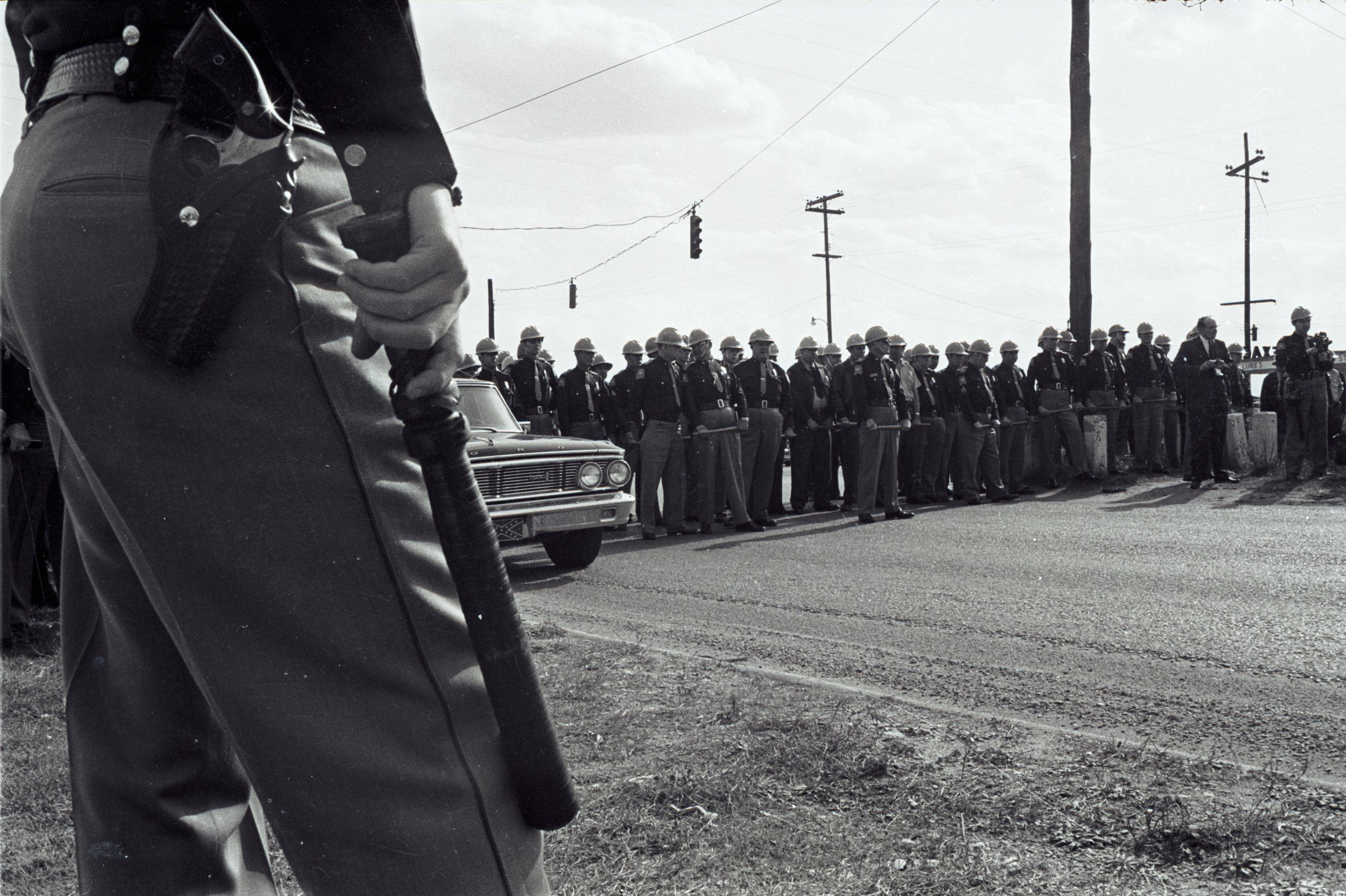
Leaves of Three Let Them Be
The poem "Leaves of Three Let Them Be" meditates on the tension between intuition, learned knowledge, and adaptability in navigating both ordinary and high-stakes situations. The title itself references the common adage warning of poison ivy, symbolizing the necessity of learned caution in the natural world. The phrase also sets the thematic stage for the poem’s exploration of when to trust preconceptions and when to challenge them.
In the first stanza, the metaphor of a blind tasting—commonly used in wine appreciation to strip away biases associated with labels—introduces the idea that we are often better served when freed from the weight of preconceptions. For sommeliers, whose craft is deeply tied to sensory perception, removing biases is necessary to fully understand the essence of what is tasted. The implicit argument is that, in areas of subjective judgment or fine distinctions, this approach enables greater clarity and authenticity. However, the poem pivots sharply in its second stanza, where it shifts the context from leisure or craft to survival, specifically on the "front lines." Here, the stakes are higher, and the dismissing of labels or preconceptions becomes not only impractical but dangerous.
The poem highlights a fundamental human dilemma: balancing the wisdom of experience—"labels and preconceptions"—with the need to remain open to new information. Labels are initially portrayed as "saviors," suggesting that our ability to categorize and interpret the world based on past knowledge is crucial for survival, especially in volatile or unpredictable environments. Yet the poem does not endorse rigid adherence to these preconceptions. The closing lines emphasize flexibility: the ability to "drop them in the face of new evidence." This nuanced argument underscores the poem's central theme—that the most adaptive and intelligent approach to the world involves a balance between relying on past knowledge and being open to change when circumstances demand it.
The poem, though concise, engages deeply with cognitive and philosophical issues, such as epistemology (how we know what we know) and the psychology of decision-making under uncertainty. It suggests that in a world marked by complexity and unpredictability, the survival of both individuals and societies depends not just on the knowledge they have accumulated but on their capacity to revise that knowledge when confronted with new truths. This openness to reconsidering one’s assumptions is framed as essential not only in intellectual pursuits but also in life-and-death situations, making it a universal call for intellectual humility and adaptability.
preconceptions, survival, adaptability, intellectual humility, blind tasting, labels, cognitive flexibility, epistemology, decision-making, new evidence.

Kaminazi
**Kaminazi** is a powerful and provocative poem that addresses themes of racial injustice, hypocrisy, and the selective application of historical guilt in American society. The poem challenges the reader to consider the double standards present in how different racial and ethnic groups are treated, particularly in academic settings.
The poem begins by asserting that America, referred to as "Amerikkka" to emphasize its systemic racism, is deeply anti-black. It suggests that if this were not the case, Asian Americans might face similar historical bullying as white Americans do for slavery, specifically being blamed for Pearl Harbor. This comparison highlights the selective way in which historical guilt is assigned and perpetuated.
The poem also critiques the performative activism often seen on college campuses and in liberal, "sanctuary" cities. The term "keffiyah wokes" likely refers to those who adopt symbols of resistance without fully engaging in meaningful activism. The imagery of "baby-bottle-shot abortion jamborees" suggests a superficial and sensationalized approach to serious issues, contrasting with the genuine struggles faced by marginalized groups.
Overall, **Kaminazi** is a scathing commentary on racial hypocrisy and the uneven distribution of historical blame, urging readers to reflect on the deeper societal injustices and the performative nature of some modern activism. It critiques the selective moral outrage and absurdity in American society. It draws parallels between the baseless accusations faced by minority groups, imagining a world where Korean kids are blamed for Pearl Harbor. This poem highlights the hypocrisy and injustice prevalent on campuses and in progressive spaces, shedding light on the nuanced struggles of marginalized communities.

michaelistvan.com (live, test run)
Please take a look at my developing website: michaelistvan.com, which you can get to as well via: safespacepress.com. I really appreciate your help. You can find a convenient sitemap here: michaelistvan.com/credits-acknowledgements-sitemap. Please check out my site and let me know if there are any bugs. It is still in draft form and needs a lot of work, but I would appreciate knowing if there any crucial problems with it.

White Supremacy on Its Deathbed
"White Supremacy on Its Deathbed" is a bold and confrontational work that challenges the mainstream antiracist movement and its implications for black empowerment. Through a mix of lyrical prose, scholarly critique, satire, and polemic, the author seeks to expose the paradoxical harms inflicted by well-intentioned but misguided efforts to dismantle white supremacy.
The book argues that the contemporary antiracist movement, exemplified by figures like Robin DiAngelo and Ibram X. Kendi, promotes an ideology that, while purporting to empower black Americans, ultimately infantilizes and debilitates them. This movement, according to the author, fosters a narrative of perpetual victimhood and helplessness among black people, which reinforces negative stereotypes and undermines genuine progress. By insisting on the omnipresence of white supremacy in every aspect of society—from everyday interactions to cultural and intellectual achievements—the antiracist movement inadvertently perpetuates the very divisions it seeks to eliminate.
The author critiques the tendency to attribute all disparities in health, education, and crime to systemic racism, while dismissing the role of personal responsibility and cultural factors. This approach, the book contends, not only demoralizes black individuals by suggesting that their fate is entirely dictated by external forces but also fuels racial tensions by framing white people as inherently oppressive and black people as inherently oppressed.
One of the central theses is that the antiracist movement's focus on symbolic gestures and emotional catharsis, rather than practical solutions, fails to address the root causes of inequality. The book criticizes the movement for promoting a form of racial essentialism that mirrors the very racism it opposes, creating racial affinity groups and encouraging a hyper-awareness of racial identity that can lead to further segregation and mistrust.
The book also delves into the economic and social incentives that drive the racism-training industry. It argues that this industry profits from sensationalizing race issues and fostering a culture of fear and division, thereby ensuring a constant demand for its services. The author suggests that this dynamic not only distracts from substantive policy discussions but also perpetuates a cycle of dependency and resentment.
Throughout the book, the author uses a combination of personal anecdotes, historical analysis, and cultural critique to make the case that the current approach to antiracism is counterproductive. By portraying black Americans as fragile and in need of constant protection, the movement undermines their agency and dignity. The author advocates for a shift towards a more empowering narrative that emphasizes resilience, personal responsibility, and a commitment to universal principles of merit and equality.
In essence, "White Supremacy on Its Deathbed" challenges readers to reconsider the dominant narratives around race and to recognize the complex, often unintended consequences of well-meaning but ultimately flawed antiracist strategies. It calls for a more nuanced and constructive approach to addressing racial disparities, one that respects the individuality and capability of black Americans while fostering genuine dialogue and understanding across racial lines.
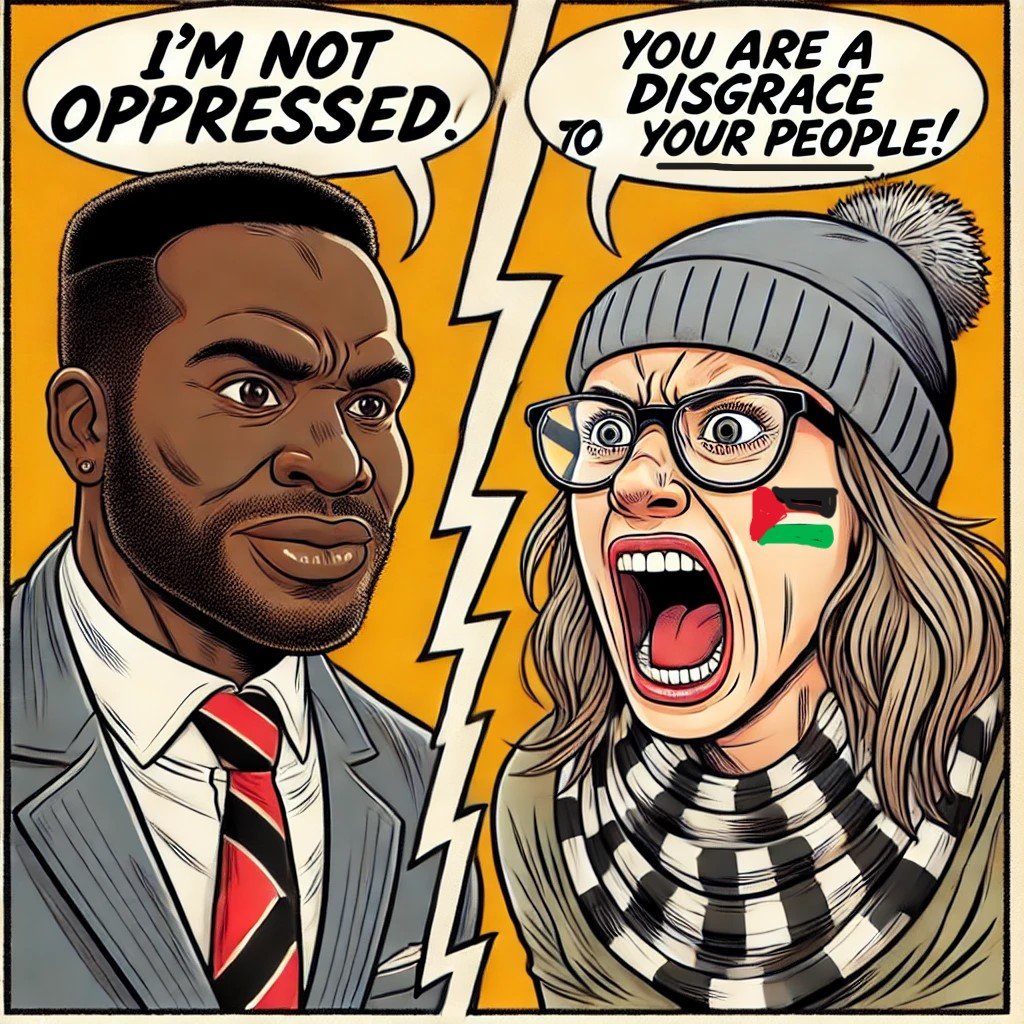
The Help
**The Help** delves into the performative solidarity and the underlying self-serving motivations of a group of white women as they navigate their own feelings of guilt and privilege. Set against the backdrop of a watch-party for the film *The Help*, the poem exposes the superficial and often condescending nature of their attempts to connect with and understand the struggles of people of color.
The scene opens with the women gathered, equipped with box rosé, scarves, and tears—a tableau of desperate solidarity. They are eager to absolve their shame and prove their subservience, glancing nervously at their token person of color. This individual, cornered before the film begins, becomes the focus of their awkward attempts at connection. Each woman, in her way, seeks to express her perceived enlightenment and distance herself from the racism of her own circle, whether by criticizing white features, expressing fear of white men (including their own husbands), or showcasing their tokenistic connections to black individuals.
Their conversation brims with self-congratulatory remarks and superficial praises, particularly directed at the actresses of the film. They fawn over Octavia Spencer's beauty, marveling at her skin, and maintain a facade of reverence and reflection, giving the floor to the "oppressed voice" only after the credits roll. This restraint is insufferable for the inebriated group, who are impatient to express their well-meaning yet condescending pity.
As the poem progresses, it becomes clear that their concern for "people of color" is tainted by their desire to be seen as saviors. They believe it is their duty to educate and uplift, yet their efforts are steeped in a patronizing attitude that fails to recognize the agency and resilience of those they claim to support. Their discussions reveal a disconnect between their self-image and the reality of their impact, highlighting a persistent, albeit well-intentioned, form of racism.
**The Help** critiques the performative nature of allyship and the superficial efforts of those who, while professing solidarity, perpetuate a dynamic of dependency and condescension. Through its vivid portrayal of a watch-party, the poem underscores the complexity and often problematic aspects of modern-day attempts at racial reconciliation.
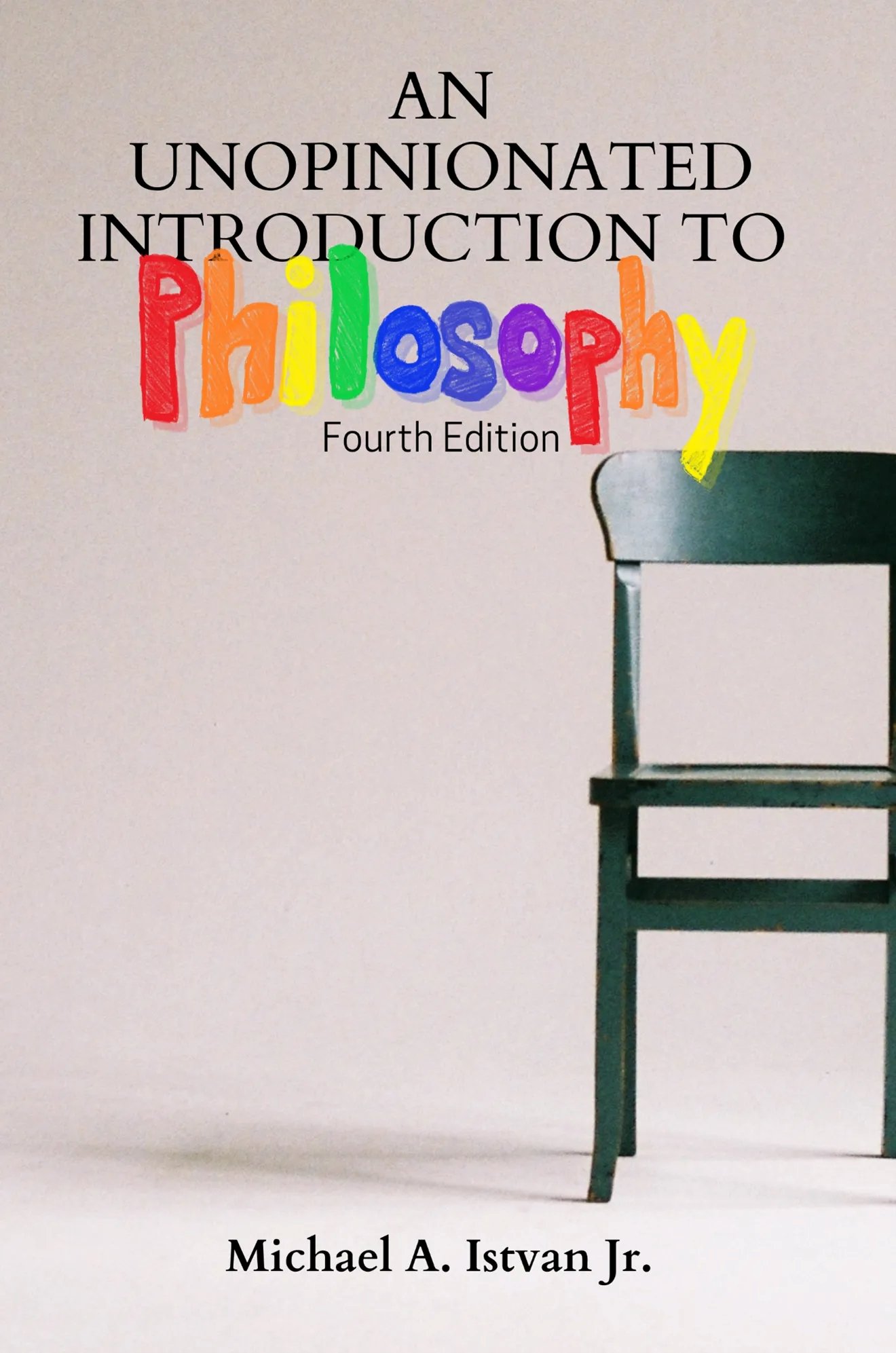
An Unopinionated Introduction to Philosophy (Fourth Edition)
"An Unopinionated Introduction to Philosophy" is a groundbreaking textbook designed to cater to the diverse sensitivities and needs of modern students. Celebrated for its pro-student approach, the book seeks to eliminate potential triggers and discomforts that have historically plagued the academic environment.
The textbook, praised for being exceptionally reader-friendly, is seen as a triumph in creating a truly inclusive and protective educational resource. It addresses the historical issue of selective protection in academia, ensuring that all students, regardless of their unique triggers, are shielded from potentially distressing content. Dr. Istvan, the author, emphasizes the necessity of moving beyond exclusionary practices and ensuring comprehensive protection for every student.
One of the central themes of the book is its commitment to removing all forms of distressing content, rather than merely labeling it with trigger warnings. This approach acknowledges the complexity and individuality of student triggers, advocating for a learning environment free from any form of discomfort. The book's inclusion of a bonus chapter on reporting professors highlights its dedication to empowering students to take action against perceived academic injustices.
The book's critics, however, argue that it undercuts traditional academic rigor by prioritizing student comfort over exposure to challenging ideas. Nonetheless, it has received widespread acclaim for its revolutionary approach to education, which places the emotional well-being of students at the forefront.
"An Unopinionated Introduction to Philosophy" also tackles the issue of macro-aggressions, recognizing that even seemingly minor aggressions can have significant impacts on students. By removing potentially harmful content and providing tools for students to report offensive material, the book aims to create a safe and supportive learning environment.
The textbook's success is attributed to its ability to balance the need for academic content with the imperative to protect students from harm. Its innovative approach has been likened to padding the corners of tables to prevent injuries—essentially, it removes the tables altogether to ensure complete safety.
In summary, "An Unopinionated Introduction to Philosophy" represents a significant shift in educational philosophy. It challenges the traditional notion that students must be exposed to uncomfortable ideas to foster learning and growth. Instead, it champions a model of education that prioritizes student safety and comfort, ensuring that all students can engage with philosophical concepts without fear of distress. This book is a testament to the evolving landscape of academia, where inclusivity and protection are paramount.
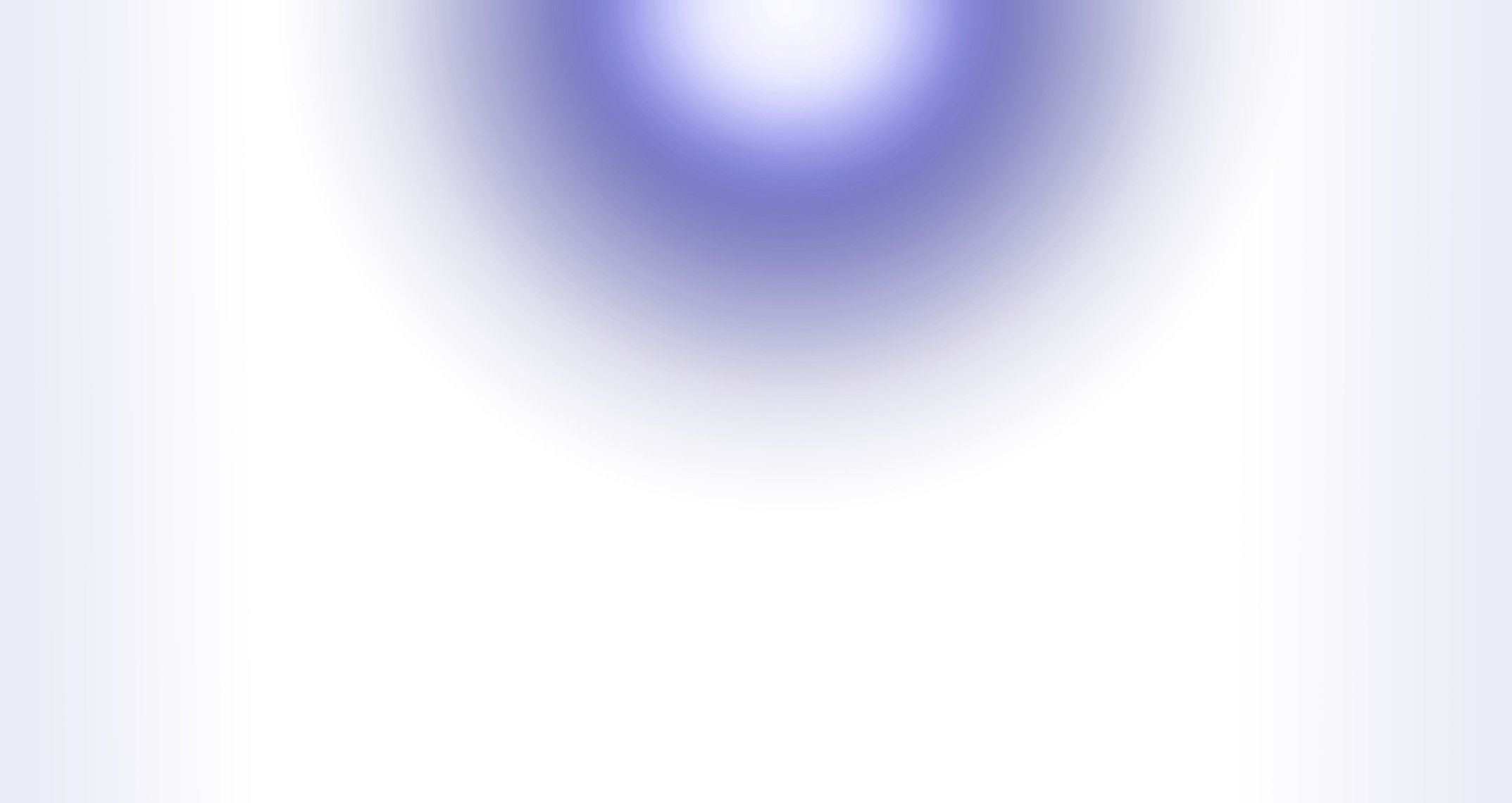
blog
FAQ

Visit my Substack: Hive Being
Visit my Substack: Hive Being

Don’t let anyone tell you that real life is lacking in poetic interest. This is exactly what the poet is for: he has the mind and the imagination to find something of interest in everyday things. Real life supplies the motifs, the points that need to be said—the actual heart of the matter; but it is the poet’s job to fashion it all into a beautiful, animated whole. You are familiar with Fürnstein, the so-called “nature poet”? He has written a poem about growing hops, and you couldn’t imagine anything nicer. I have now asked him to write some poems celebrating the work of skilled artisans, in particular weavers, and I am quite sure he will succeed; he has lived among such people from an early age, he knows the subject inside out, and will be in full command of his material. That is the advantage of small works: you need only choose subjects that you know and have at your command. With a longer poetic work, however, this is not possible. There is no way around it: all the different threads that tie the whole thing together, and are woven into the design, have to be shown in accurate detail. Young people only have a one-sided view of things, whereas a longer work requires a multiplicity of viewpoints—and that’s where they come unstuck.—Goethe (Conversations with Eckermann)
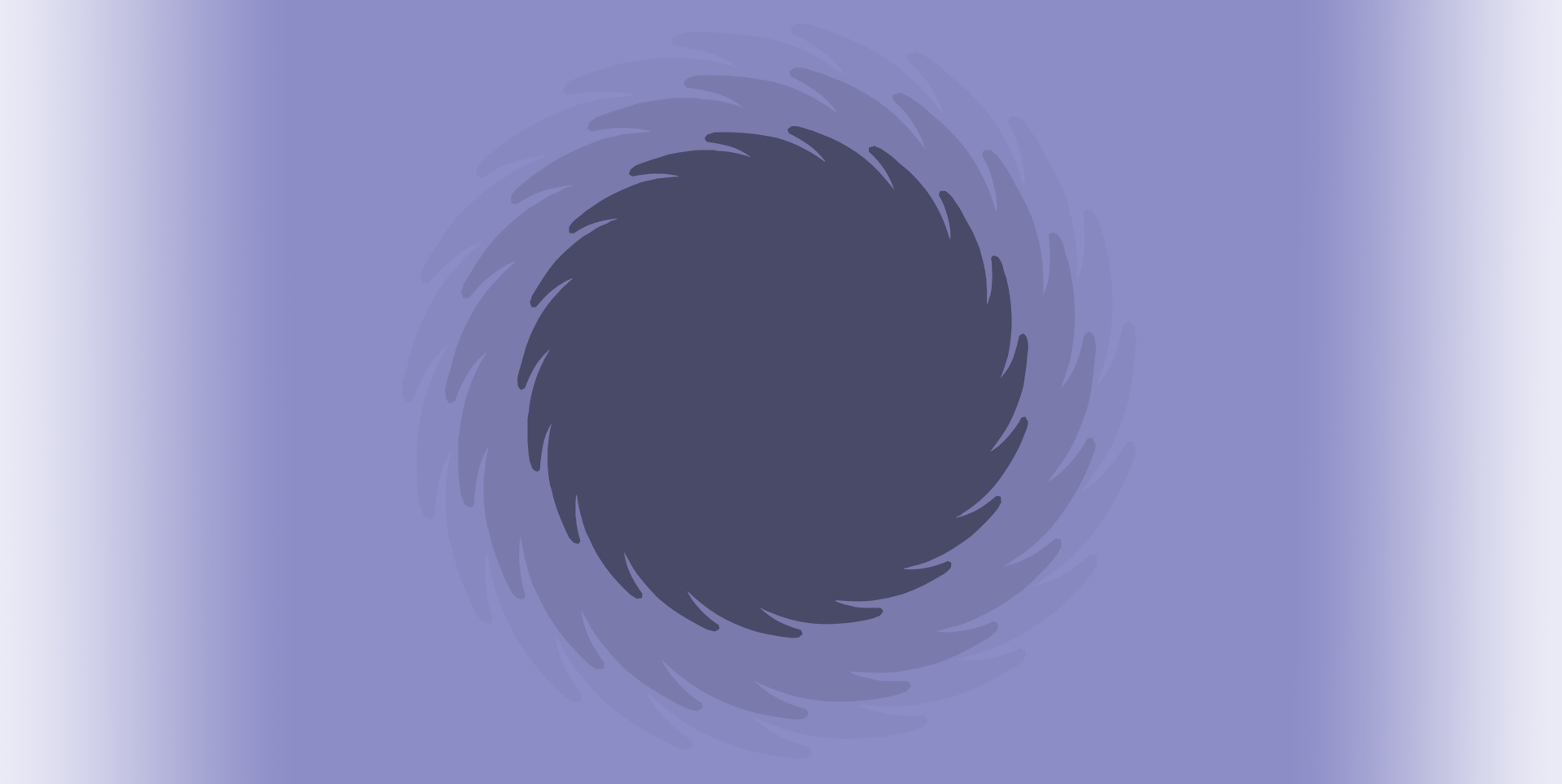
Featured Blog Posts
have appeared last night—
all those met along the way?
























